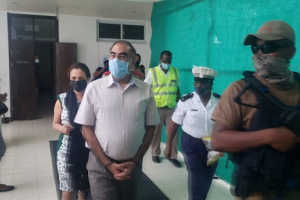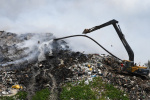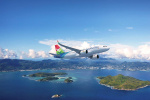Our Ocean Conference: Seychelles to pilot integration of ocean science in school curriculum

Ramkalawan said Seychelles has known success in the past with the inculcation of environmental conservation values into its society through school children. (EBA project, Facebook) Photo License: All Rights Reserved
(Seychelles News Agency) - Seychelles will pilot a project this year that integrates ocean science in its school curriculum, said President Wavel Ramkalawan on Tuesday at the heads of state high level segment in the 9th Our Ocean Conference in Athens, Greece.
He said that the island nation has known success in the past with the inculcation of environmental conservation values into its society through school children.
"Now it is high time that we strive to do the same with our ocean science values and I call upon all of us here present to join us in this endeavour and to become catalysts for unparalleled actions," said Ramkalawan.
Seychelles' President stressed that life at sea and near the sea is a culture that is not only to be celebrated but one that needs to be appropriately sustained and translated to the next generation, who he described as shareholders and successors of the 71 percent aquatic global heritage.
"Hence comes the dire needs for this generation, as well as the next, to be taught why and how we need to change our mindsets in regards to how we view and treat the ocean and all of Earth's aquatic sources," he added.
Ramkalawan said the African Union has recognised the Blue Economy as the continent's development pathway and Seychelles has embraced this concept wholeheartedly as it aligns with its traditions, values and way of life.
He spoke about international trade, the cornerstone of modern-day civilisation and central to most industries' supply chains and the global economy, which he said is almost single-handedly powered by sea freight.
 |
| The participants at the 9th Our Ocean Conference in Athens, Greece. (State House) Photo License: CC-BY |
"I urge everyone to see and accept the vulnerabilities of island states like Seychelles when marine commercial routes are disrupted as is currently happening in the Red Sea. The Mediterranean at one end and the Indian Ocean at the other are the two regions facing the consequences of warring madness. This causes much damage not only to our economies but to the livelihood of our people as the cost of living keeps going up," Ramkalawan highlighted.
He said another scourge is marine litter that is transported by ocean currents again from one corner of the world to the next even to seemingly isolated and pristine areas like Seychelles' Aldabra atoll, a UNESCO World Heritage site.
"We cannot continue to take for granted Earth's aquatic resources or to treat our uncharted oceanic space as a bottomless sink for our waste and expect to still thrive at the expense of others because eventually we will all be affected," he said.
Ramkalawan spoke about the need and willingness to adapt as all the incentives are there.
"We need to change attitudes, get our people involved, and put them at the centre of our strategies. We need to effectively communicate and explain to them why we need to do things that we do. We need to start with our youths who are the beacon of hope and who have a good track record for being agents of change," he added.
He said Seychelles has already made headway with its Marine Spatial Plan and has achieved the protection of 30 percent of its marine territory before 2030, the set global deadline.
"We do not only need commitments and pledges but we also need to transform words into deeds. Let this ocean conference be the nexus where Seychelles and the global community essentially converge to create, expand and mobilise networks for the sustained health and sustainable use of our oceans," he concluded.





